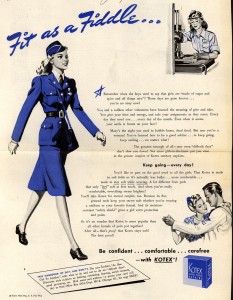Back in the fall, we convened a Metadata Task Group (which I chair) charged, in part, with defining, overseeing, and performing the work necessary to remediate Duke University Libraries’ digital collections metadata in preparation for migration from our old technical platform to the Duke Digital Repository. This involved an intensive analysis and review of our existing metadata field usage, and documentation of that analysis as well as recommendations for remediation. Before we truly engaged with this work, however, we defined a set of guiding principles to provide ourselves with a context for completing our tasks.
The first guiding principle we defined was that of Fitness for Purpose. As applied to metadata work, fitness for purpose entails that metadata be appropriate for user and system needs, both now and, in as much as it can be predetermined, in the future. This is an overarching principle which informs subsequent guiding principles. It seems like a pretty basic concept, but I think it is all too easy to lose sight of who will be using the collections we create metadata for (which is a difficult question to answer anyways), and of course, it’s always important to ensure that the metadata specifications take into account the technical environment in which it will live.
Our next guiding principle is Broad Applicability. Over the past 20 years, digital collections at Duke were developed often in an ad hoc way, each digital collection’s metadata specifications being created in a somewhat isolated fashion. Now that we have a dedicated staff person (me!) to take a comprehensive look at metadata practices at DUL, we are very interested in developing guidelines and specifications that can be applied broadly, across a variety of collections and materials. This is especially important considering the breadth and variety of collections that will live together in the Duke Digital Repository.
Along with Broad Applicability, Broad Shareability is equally important. With the formation of metadata aggregators such as the Digital Public Library of America, the possibilities for sharing our metadata and thus our resources broadly is much greater than in the past, and therefore metadata must be remediated, created, and mapped to widely used standards in ways that allow for clear, meaningful sharing. As much as possible, we are aligning our metadata practices with the DPLA’s Metadata Application Profile.
And, of course, our guiding principles wouldn’t be complete without a nod toward the future: our last principle is that we be Forward-Thinking. Change is a constant when working with metadata/digital resources, and so we must do our best to develop recommendations and guidelines that allow for this eventuality, e.g., adopting standards and practices that have the greatest staying power and allow for the adoption of new technologies. Specifically, we should be aware of linked data technologies and make recommendations that are linked-data aware and/or ready.
At the outset of this project it had felt a little bit like, “well, duh”, to develop these broad guiding principles, but at 6+ months in, I am really glad we took the time to define them – I have referred back to them periodically as we tackle each task in our charge, and find them helpful not just when communicating outside our group but as a way to provide a sort of intellectual context internally as well.





